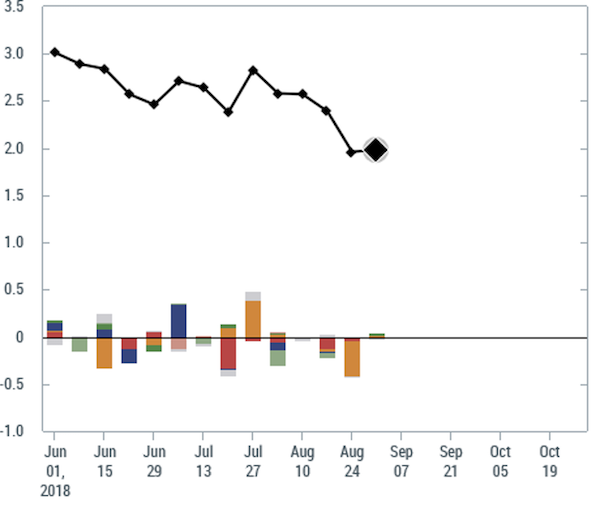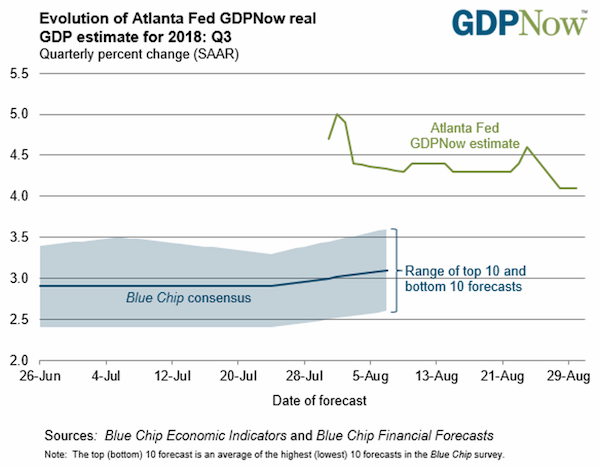
Salvador Dali� Portrait of Picasso �1947

Bit short today. I think because all the focus is one two funerals I don’t care much about. In one, a bishop grabs boobs, in the other the one person not invited gets all the attention.

Is that a surprise?
• Is The US Economic Boom Beginning To Fizzle Out? (Coppola)
President Trump is not going to be too happy with the New York Fed’s latest nowcast for Q3 2018. The staff projection, based upon the latest data, shows annualized quarter-on-quarter GDP growth slowing to 2% per annum. At the end of 2017 it was 4%, and even at the end of Q2 it was 3%.

The Atlanta Fed’s nowcast, which calculates GDP growth in the same way as the U.S. Bureau of Economic Analysis, also shows GDP growth slowing in Q3, though from a higher level. The Atlanta Fed’s growth estimate for Q3 is 4.1%. President Trump will no doubt be happy with this, but not so happy with the fact that at the beginning of August the estimate was 5%.

So what has gone wrong? Why are the nowcasts suggesting that U.S. economic growth is beginning to slow? The indicators that go into the NY Fed’s nowcasts have been gradually turning red for some time now. There appears to be something of a downturn going on in the housing market; both new starts and sales have fallen. Exports have fallen and imports have risen, apparently because of worsening terms of trade, most likely due to the strong dollar. Most recently, manufacturers have drawn down inventories, and there is a fall in orders and shipments for durable goods. There are no dramatic drops, but it all adds up to a gradual economic slowdown.

How long have you realized this, Jeroen, and what have you done to repair it?
• Former Eurogroup Head Dijsselbloem Says Demands On Greeks Were Too Heavy (R.)
Euro zone countries have asked for too much from the Greek people in return for international bailout loans, former Eurogroup chief Jeroen Dijsselbloem said in an interview on Dutch television on Saturday. “On reforms, we have asked a lot from the Greek people, too much,” Dijsselbloem told current affairs program Nieuwsuur. “Reforms are hard enough to accomplish in a society with a well-functioning government, but this was obviously not the case in Greece.” Greece emerged from the biggest bailout in economic history on Aug. 20, after receiving 288 billion euros in financial aid since 2010, with the European Union as its biggest lender.
During the crisis, the Greek economy shrank by a quarter, pushing a third of the population into poverty and driving thousands to move abroad. “Greece is obviously not a success story,” Dijsselbloem said. “Their crisis has been so deep, that you can’t call it a success.” Dijsselbloem chaired the Eurogroup of euro zone finance ministers from 2013 until the beginning of 2018, and led dozens of lengthy emergency meetings during which bailouts for Greece, Cyprus and the Spanish banking sector were grudgingly pieced together.

Sister act.
• The IMF Abetted The European Union’s Subversion Of Greek Democracy (Mody)
European authorities never allowed a conversation around the core imperative of reducing Greece’s debt burden. Syriza formed a government on January 25, 2015. On January 31, Erkki Liikanen, governor of Finland’s central bank and, in that capacity, a member of the ECB’s Governing Council, threatened that the ECB would stop funding Greek banks if the Greek government did not agree to the terms of the creditors. And on February 4, the ECB decided Greece’s fate. In an aggressive move that took everyone by surprise, the ECB cut off funding to Greek banks, preemptively immobilizing the Greek government before it could begin negotiations with its creditors.
The ECB withdrew an earlier arrangement under which Greek banks used their government bonds as collateral (security) to obtain funds for running their day-to-day operations. Although Greek government bonds had a junk rating and normally only higher-rated bonds qualified as collateral, the ECB had waived that requirement to help the banks stay afloat. With its February 4 decision, the ECB revoked that waiver. Greek banks could now borrow only from the Greek central bank under an Emergency Liquidity Arrangement (ELA); ELA funds carried a higher interest rate and, moreover, could be turned off at any time, thus choking the Greek financial system.
Stock prices of Greek banks fell sharply, and two days later, the rating agency S&P pushed the government bonds’ rating further into junk territory. With continuing deposit flight from Greek banks and the threat of a financial meltdown, the Syriza government rapidly lost all leverage before it could use its economic argument in a political negotiation.

More Belt and Road.
• Ethiopia Debt Woes Curtail China Funding (R.)
Ethiopia has been lauded by experts from China’s ruling Communist Party as a “model country” in Beijing’s $126 billion Belt and Road initiative to build rail, road and sea links tying China to Eurasia and Africa. But as the Horn of Africa nation of 100 million people faces debt distress, there are signs that China, a major creditor, is slowing financing to Ethiopia as doubts grow over the profitability of some infrastructure projects there. “The intensifying repayment risks from the Ethiopian government’s debt reaching 59 percent of GDP is worrying investors,” China’s mission to the African Union in Addis Ababa said on its website in July.
It said that Chinese investment in the country was cooling and that the China Export and Credit Insurance Corp was reducing the scale of its investment there. Against a backdrop of rising worry over African indebtedness to China, Prime Minister Abiy Ahmed will visit Beijing for the Forum on China-Africa Cooperation (FOCAC), which starts on Monday. He is due to meet Chinese Prime Minister Li Keqiang and is expected to court investment from Chinese firms into Ethiopia’s agro-industrial and pharmaceutical businesses, China’s Xinhua news agency said. Ethiopia has been a top destination for Chinese loans in Africa, despite its lack of natural resources, with state policy banks extending it more than $12.1 billion since 2000, according to the China Africa Research Initiative (CARI) at the Johns Hopkins School of Advanced International Studies in Washington (SAIS).

Not your call, Theresa.
• May Vows No Compromise With EU On Brexit Plan (BBC)
Theresa May has insisted she will not be forced into watering down her Brexit plan during negotiations with the EU. Writing in the Sunday Telegraph, the prime minister says she will “not be pushed” into compromises on her Chequers agreement that are not in the “national interest”. But Mrs May also warns she will not “give in” to those calling for a second referendum on the withdrawal agreement. She says it would be a “gross betrayal of our democracy and… trust”. The People’s Vote, a cross-party group including some MPs, is calling for a public vote on the final Brexit deal. The UK is on course to leave the EU on 29 March and the government had previously ruled out another referendum.
The prime minister writes that the coming months are “critical in shaping the future of our country”, but that she is “clear” about her mission in fulfilling “the democratic decision of the British people”. She adds that following the Chequers agreement in July – which led to the resignation of two cabinet ministers – “real progress” has been made in Brexit negotiations. While there is more negotiating to be done, Mrs May writes: “We want to leave with a good deal and we are confident we can reach one.” The government has been preparing for a no-deal scenario, even though this would create “real challenges for both the UK and the EU” in some sectors, she says. But the PM adds: “We would get through it and go on to thrive.”

Just as they’ve voted in Imran Khan, who once suggested he might order the shooting down of U.S. drones if they entered Pakistani airspace, [and] has opposed the United States’ open-ended presence in Afghanistan.
• Pentagon Cancels Aid To Pakistan Over Record On Militants (R.)
The U.S. military said it has made a final decision to cancel $300 million in aid to Pakistan that had been suspended over Islamabad’s perceived failure to take decisive action against militants, in a new blow to deteriorating ties. The so-called Coalition Support Funds were part of a broader suspension in aid to Pakistan announced by President Donald Trump at the start of the year, when he accused Pakistan of rewarding past assistance with “nothing but lies & deceit.” The Trump administration says Islamabad is granting safe haven to insurgents who are waging a 17-year-old war in neighboring Afghanistan, a charge Pakistan denies. But U.S. officials had held out the possibility that Pakistan could win back that support if it changed its behavior.
U.S. Defense Secretary Jim Mattis, in particular, had an opportunity to authorize $300 million in CSF funds through this summer – if he saw concrete Pakistani actions to go after insurgents. Mattis chose not to, a U.S. official told Reuters. “Due to a lack of Pakistani decisive actions in support of the South Asia Strategy the remaining $300 (million) was reprogrammed,” Pentagon spokesman Lieutenant Colonel Kone Faulkner said. Faulkner said the Pentagon aimed to spend the $300 million on “other urgent priorities” if approved by Congress. He said another $500 million in CSF was stripped by Congress from Pakistan earlier this year, to bring the total withheld to $800 million. The disclosure came ahead of an expected visit by U.S. Secretary of State Mike Pompeo and the top U.S. military officer, General Joseph Dunford, to Islamabad. Mattis told reporters on Tuesday that combating militants would be a “primary part of the discussion.”

8,000 lawsuits. And Bayer is not a US company, big difference.
• Monsanto-Bayer: Eliminating The Name Will Not Erase The Criminal History (CD)
Cancelling out Monsanto’s name and keeping only that of Bayer, does not mean forgetting the wrongdoings of a company which, according to the verdict of the Monsanto Tribunal of The Hague, is stained with crimes of ecocide. With Bayer’s official takeover of Monsanto, the giant multinational also inherits its liabilities. On the eve of the start of the integration process, Monsanto has been held liable for causing cancer through the use of its glyphosate-based weedkiller Roundup and ordered to pay $289 million of damages to the plaintiff Dewayne Lee Johnson in the first landmark case, settled in California in mid August 2018. The jury also found that Monsanto “acted with malice or oppression.”
According to Reuters, the number of lawsuits brought against Bayer’s newly acquired Monsanto is approximately 8000 in the US alone. UN experts Ms Hilal Elver, Special Rapporteur on the right to food and Mr. Dainius Puras, Special Rapporteur on the right to physical and mental health, defined the ruling “a significant recognition of the human rights of victims, and the responsibilities of chemical companies.” Revelations in reports published last year, most notably the “Monsanto Papers” and the “Poison Papers“, have shed light on strategies of big agrochemical groups to expand their empires: from lobbying, interference in government agencies’ proceedings, attacks in collusion with institutions on independent science, to mega mergers and acquisitions.
For the first time part of these documents were shown to a jury, which were able, among other things to also see that, “at least starting 20 years ago, Monsanto has known that their product can cause cancer, and has gone out of its way to ignore it and/or fight any science that suggests a link”, as declared to Democracy Now by Brent Wisner, the lead trial counsel for Dewayne Lee Johnson in his lawsuit against Monsanto. Added to this, in the same week, California’s Supreme Court rejected a challenge by Monsanto to the state’s decision to include glyphosate in its Proposition 65 list of carcinogens.

How clean is the air?
• What’s Happening To Our Weather? The Answers Are Hiding In Arctic Air (G.)
I am standing on the ocean. Ahead of me, the world is split into two perfect halves: blue sky above, white sea ice below. The view is clean and simple, but a continuous waltz of swirling and shunting is hidden inside those two colours: the inner workings of the Arctic engine. This place is special for many reasons, and to appreciate one of the most unusual all I need to do is to live; to breathe. The air is -2C, but the air coming from my lungs is invisible. The familiar wisps of cold breath that I associate with crisp winter air in Britain are absent. They cannot form here. And that anomaly is connected in a fundamental way to our presence here, on a scientific expedition to study this environment. For two months, the Swedish icebreaker Oden is home to 74 of us, living and working at the top of the world to tap into the stories that the blue and the white have to tell.
The Arctic has held on to its mystique for centuries. Many western explorers have pitted their wits, strength, and endurance against this environment, while traditional Arctic communities have learned to work with the complexities of the ice rather than against them. Those of us who live well south of the Arctic circle hear a lot about how the white in the north is changing, but less about how it is. It’s hard to construct a secondhand mental image of what it’s like here. There are no landmarks and you cannot step in the footprints of the past. This is an ocean with an icy shell that cracks and shifts as it’s pushed by the wind, breaking apart into separate floes or piling up to form ridges.









Home › Forums › Debt Rattle September 2 2018